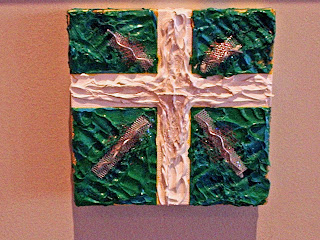 Psalms 102 * 107:1-32; Numbers 20:1-13; Romans 5:12-21; Matthew 20:29-34
Psalms 102 * 107:1-32; Numbers 20:1-13; Romans 5:12-21; Matthew 20:29-34I am headed up to Cape Cod today for a week's vacation. This picture is what is right outside the living room window of the place I rent every year. Although a long slow drive is in front of me, there is this place, this Shangri-la, awaiting my arrival. I have been going to this place for about ten years now, and although I don't own it and I go only once a year for a week or two, it still has the feeling of home to me: I can decompress very quickly in this setting.
Decompression is important, relaxing and letting go is important, these are all things that help re-center me. I am bringing some art projects and an idea for a new book with me: I may or may not get to any of these things. But having options available is not a bad idea. There is a certain compassionate understanding of the world that can come from this re-centering I am about to enter into this week. A compassionate understanding of myself, of my needs, wants and desires. A compassionate understanding of the world that I inhabit, both close in to me, and seemingly further away from my daily existence.
Out of his compassion, Jesus touches two blind men today, sitting on the side of the road as he leaves Jericho. These two were not part of Jesus' close-in world, they didn't touch him metaphorically, yet he touched them: in spirit and physically. It would have been very easy for Jesus to keep going on his way, oblivious of their plight, absorbed in his own trek to Jerusalem. Yet, he didn't stay inner-focused but heard their cries, and out of compassion touched and healed them. I wonder who I will pass today and whether I can have some of that compassion to touch those I pass and not be so self-absorbed in my own trek north.
jfd+
Copyright 2008, John F. Dwyer. All Rights Reserved.












